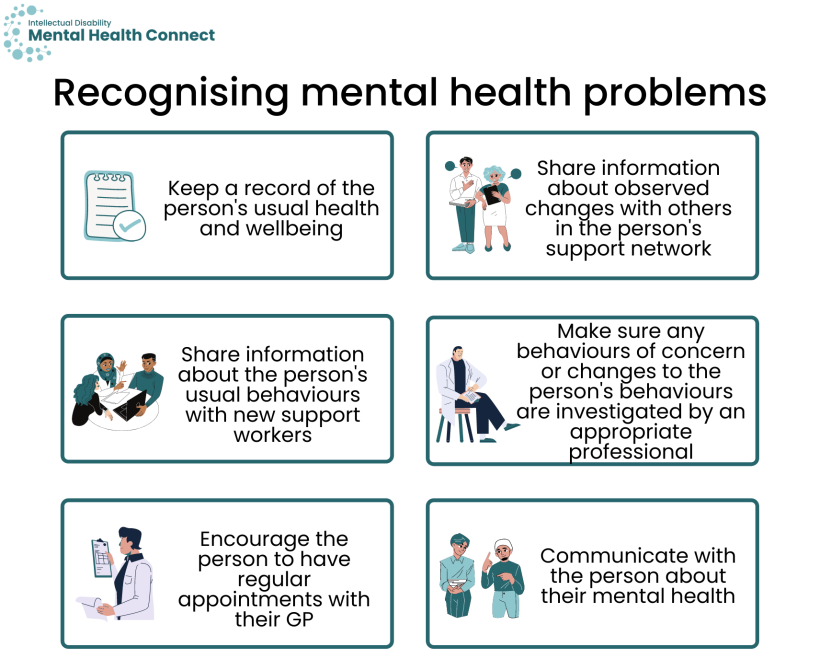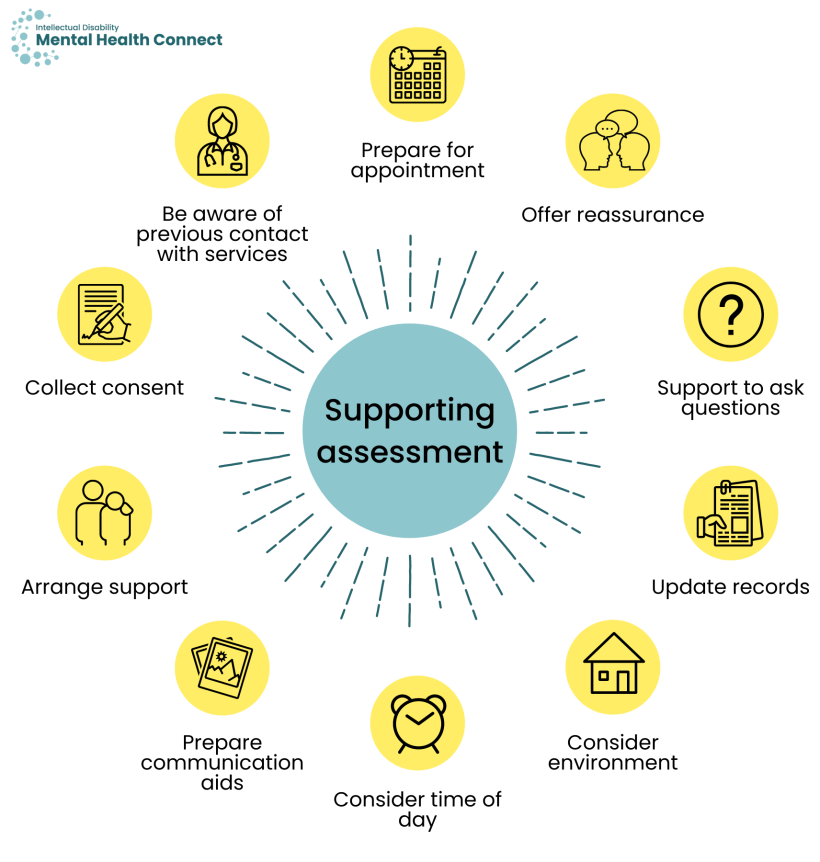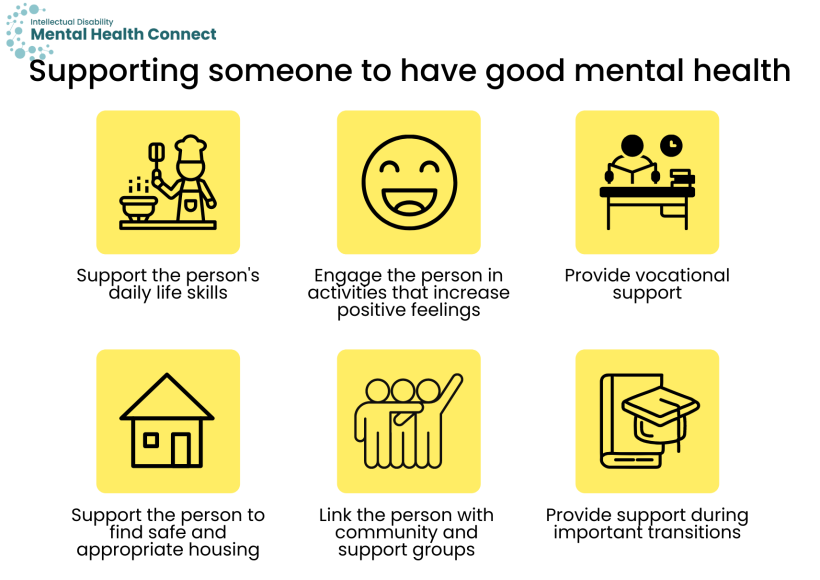Role of disability services
Jump to a section below
Key points
- Disability professionals and services play a significant role in a person’s mental health. Improving mental health outcomes of people with disability is a major part of Australia’s Disability Strategy 2021–2031.
- Disability professionals have regular contact with the people they support, meaning that they are in a good position to observe early signs of mental health problems.
- Along a mental health pathway, disability professionals and services are key to providing support for the person’s communication and daily support needs, as well as ensuring that mental health treatment strategies are adhered to.
- Learning about mental health and building capacity in the area of intellectual disability mental health can help improve mental health outcomes for people with intellectual disability.
Recognising mental health problems
As a disability professional, it is important to be aware of signs that may indicate a person with intellectual disability is having mental health problems, such as changes in behaviour. You can read more about recognising mental health problems in the section for family and support persons.
To help recognise if a person with intellectual disability is experiencing mental health problems, you can:
- keep a record of information about a person’s usual health and wellbeing, and any changes that have been observed. Keeping a record can allow changes in a person’s health or mental wellbeing to be detected. Disability professionals are often best placed to observe changes. You can find more information about how to record changes in Recognising mental health problems
- share information about observed changes with others in the person’s support networks, particularly if the person has multiple people providing care and support. This could be done by keeping a diary or a log. You could check with your organisation to see if they have a preferred method for disability support workers to share information
- share information about the person’s usual behaviours with new support workers so that they can identify changes from the outset. Disability services and organisations can consider having a formal way of recording and sharing this information within their service
- make sure that any behaviours of concern or changes to the person’s behaviours are investigated by an appropriate professional. Often, these behaviours are an attempt to communicate a physical or mental health problem
- encourage the person to have regular appointments with their GP, so that there is proactive primary care to identify any mental health problems early. Disability professionals should be aware of the person’s health needs and status
- communicate with the person about their mental health and assure them that they can come to you if they need help.

How to help people to seek help and where to start
There are various ways that you can help the person to seek help for their mental health. For more information about each of these steps, please view the Getting support for my mental health section (with information that can be provided to people with intellectual disabilty) and the Supporting someone along a mental health pathway section.
- If the person is in crisis, see the Emergency help page for what to do.
- Encourage the person to speak to their GP first. Their GP will be able to provide help or a referral to an appropriate mental health professional.
- Support the person to seek a counsellor if they want to talk to someone about stressful events.
- Support the person to call mental health helplines or call on their behalf, if appropriate. Some mental health helplines also have webchat options available, which you could support the person to access if that option is preferable.
- Let the person know that they can also get help online. You could provide some examples of websites and online tools that may help and support them to use these online resources. One example is Healthy Mind, which was developed for people with intellectual disability. You could support the person to access and understand the information on this website.
- Let the person know that they can communicate with you or someone they trust such as a carer, family member, friend or health professional.
- Check with your organisation’s policies and procedures to see if there are any specific requirements that you may have as a disability service provider.
Supporting someone across a mental health pathway
Disability services play an important role at each stage of the mental health care pathway. You can see an overview of the stages of the care pathway and what is involved in each stage here.
Services can develop workforce capacity around working with people with intellectual disability and mental health problems. Workforce capacity can be built through engaging in online learning, such as through 3DN’s Intellectual Disability Health Education courses for disability professionals, or other professional development opportunities.
Disability services and support workers can prepare the person for intake by:
- explaining what the mental health professional does, the purpose of seeing them, and how they can assist the person with their mental health
- helping the person prepare for the intake visit or phone call by role playing what might happen during the session
- encouraging the person to write a list of questions to ask the mental health professional. See Your first appointment within the I am a person with intellectual disability section for more information and ideas. The document is in an Easy Read format, so you could view the document together with the person you support
- explaining to the person what may happen at the end of the intake session – they may make an appointment for an assessment or may need to wait to hear whether the service will be right for them
- encouraging the person to let the mental health professional know if they do not understand something the professional is saying. They can let the professional know how they best understand information. You could also provide communication support, if this is OK with the person.
Disability professionals could also work together with the mental health professional by:
- letting them know the person’s preferred communication methods. You can also let the mental health professional know how you can assist in communication support
- arranging the intake session at a time and environment that suits the person best.
Disability services can encourage and assist support workers to be involved in the assessment process where appropriate. Some actions you can take to support the person include:
- preparing for the appointment by ensuring the person knows the time and place of the appointment and who they will see. It is important that you support the person in the usual way, as you would for other upcoming events (e.g. it may be written on their activity board or diary and talked about in the weekly and daily plan)
- offering reassurance and letting them know you are available to talk
- helping the person to think of and write down any questions they may have and encouraging them to take this list to the appointment
- updating information records to ensure that recorded information about behaviours (usual and changes) are up to date and accessible. This can help with providing information about the person’s behaviours and what their usual baseline functioning is. For more information about recording information about behaviours and wellbeing, see Recognising mental health problems
- considering the most appropriate environment for the assessment. If possible, it may be more appropriate to arrange for the assessment to be conducted in an environment the person is familiar with (e.g. their home)
- considering the time of day for the assessment and what would best suit the person and their routine
- preparing communication resources for the appointment. You can indicate if the person has specific communication support needs for the assessment and work out together with the mental health professional how supports can be provided for the duration of the assessment
- arranging a support person to accompany the person if this is what they would like
- collecting consent from the person’s guardian if this is necessary
- being aware of the person’s previous contact with mental health services and any negative experiences they may have had. The person may require additional support if they have had negative experiences in the past.
You can use our planning and checklist tool to help guide how you support the person through the assessment process.

Disability services can also:
- consider whether an emergency department management plan is needed to help facilitate assessment for service users. Tools like the A2D Together folder may be helpful in building the management plan. The emergency department management plan may include:
- brief medical history
- list of medications
- professionals involved in the person’s care
- behaviour support plan techniques
- considerations for the person (e.g. sensory requirements, their likes and dislikes, topics they like to talk about to help build rapport or reduce distress)
- raise awareness that specialist intellectual disability mental health services are available for health and mental health professionals to consult. You can find more information on these services here
- provide resources and further training or education on supporting mental health assessment to support workers, such as through 3DN’s Intellectual Disability Health Education e-learning courses which are available for a small fee
Treatment planning
Disability services and support workers can:
- be informed about laws in your state and territory that guide decision-making and consent for people with disability, and advocate for the person to be involved in decision-making as much as possible
- For information on capacity to consent and supported decision-making in NSW, see the NSW Trustee & Guardian website which includes a Capacity Toolkit
- consider how the person will get to their appointments
- ensure that all members of the team have a copy of the person’s treatment plan.
Early stages
Disability services and support workers can:
- consider whether the individual’s support needs (e.g. behaviour support, daily life skills) are being met during mental health treatment, and whether NDIS funding is being used effectively to meet these needs
- accompany a person with intellectual disability to their treatment session or appointment (where appropriate and if the person with intellectual disability or their guardian agrees). They can:
- help to provide and interpret information
- learn about the person’s treatment plan. If you would like to read about what treatment plans include, you can find detailed information here
- learn how they can consistently support the person to use their coping strategies
- learn how they can support the person if they become distressed or show behaviours of concern
- obtain support to manage behaviours of concern. Services could suggest engaging a behaviour support practitioner or a review of the person’s existing behaviour support plan.
Ongoing monitoring
Disability services and support workers can:
- review a person’s treatment plan and how they are responding to treatment, especially when they live in a group home or supported independent living. If any changes are noticed, contact the person’s next of kin or appropriate medical professional
- share progress reports with others in the person’s mental health team and participate in regular multidisciplinary review sessions
- be aware of when to encourage the person to seek a medication review with their GP or psychiatrist, and how they can help to advocate for the person if they are not responding to treatment. The person could also obtain a Home Medicines Review, conducted by an accredited pharmacist. Support workers can find more information in Strategies for common challenges
- provide support workers with resources and further training or education on supporting mental health treatment, such as through 3DN’s Intellectual Disability Health Education e-learning courses
- encourage mentoring for support workers, including talking to colleagues about strategies and debriefing after stressful situations. More information for support workers can be found in the Looking after myself section and 3DN’s Intellectual Disability Health Education e-learning course Supporting Carers, Colleagues and Self-Care, available for a small fee.
When a service comes to an end, disability services and support workers can:
- ensure that support workers are familiar with the person’s discharge, or Transfer of Care plan and can assist in its implementation by
- accompanying the person to follow-up appointments
- supporting ongoing treatment (e.g. implementing psychological techniques and/or making sure the person adheres to their medication schedule)
- ensure that there is a clear plan for monitoring the person’s recovery that is used consistently by all those providing care and support to the person (e.g. keeping a diary or log in which support workers can write brief notes after their shifts)
- ensure that supports for daily needs and behaviour are in place
- link the person with community activity and support groups for social connections
- link the person with educational or vocational supports if they would like guidance in this area. You could work together with social services to do this
- encourage the person to discuss the development of a crisis plan with their GP or psychiatrist, or ensure that support workers are familiar with the crisis plan if one exists
- encourage the person to talk to someone they trust if they start to feel unwell again
- provide support workers with resources and further training or education on supporting mental health recovery and what to do during a mental health crisis, such as through 3DN’s Intellectual Disability Health Education e-learning courses
Broader role in supporting someone to have good mental health
Disability services and professionals play a broad role in supporting a person to have good mental health.

For example:
- supporting the person’s daily life skills so that they experience a sense of achievement and self-efficacy
- engaging the person in enjoyable activities that can increase positive feelings
- providing vocational support to the person so that they can engage in something meaningful that can provide a sense of purpose
- helping the person to find a job
- helping the person to engage in study
- supporting the person with any mandatory job training
- linking the person with employment and education services
- linking in with social services and supporting the person to find safe and appropriate housing, especially for those facing homelessness or living in unsuitable housing that may be contributing to mental health problems
- Homelessness Australia provides a list of organisations that provide homelessness information and referral telephone services for those who are homeless or at risk of homelessness
- linking the person with community activities and support groups for social connections
- providing support during important transitions (e.g. from finishing school to entering the workforce).
For more information on how to support good mental health, see Mental health promotion and Tips for good mental health (within the I am a person with intellectual disability section).